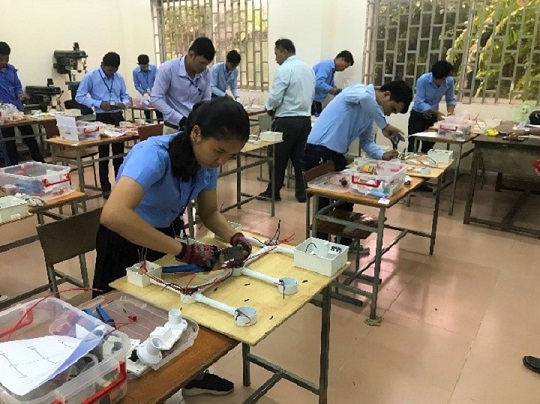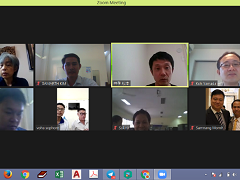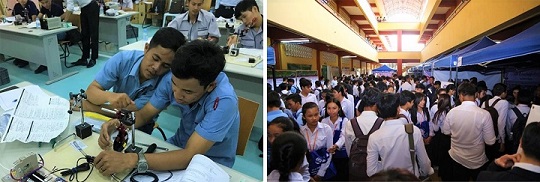Support for developing human resources for manufacturing industry in Cambodia: Cooperation continues, overcoming the COVID-19 pandemic
2021.01.15
Cambodia has recently been achieving rapid economic growth. To develop human resources that support this growth, quality training is essential. Since 2015, JICA has been cooperating to improve TVET (Technical and Vocational Education and Training) quality with more practical activities to meet industry needs and to provide technicians who play a vital role in manufacturing.
Despite the COVID-19 pandemic, JICA's cooperation has been continued. In September 2020, the Standard Training Package (STP) for electrical installation and maintenance was approved as the first diploma-level two-year course national curricula. The STP includes training curricula and information on necessary training equipment for this occupation. It is expected to promote TVET training that better fits the needs of industry, and to contribute to raising the excellent quality of Cambodian technicians, equipped with knowledge and skills to play a key role in the front line.

Students practicing electrical installation at TVET institutes
YAMADA Koh, chief advisor of the project, dispatched from the Ministry of Health, Labour and Welfare, Japan, commented that, "STP is based on practical training experiences, utilizing newly custom-made training equipment at three pilot TVET institutes in Phnom Penh. These are NPIC (National Polytechnic Institute of Cambodia), NTTI (National Technical Training Institute), and PPI (Preah Kossomak Polytechnic Institute).
“We finalized a draft package with the collaboration of industries aligned with the ASEAN qualification framework in March 2020. Since April, work proceeded at the Ministry of Labour and Vocational Training. Then in September, the package was officially approved, which was originally expected to be done after the project’s term. It was achieved by the efforts of all the persons concerned."

Online meeting with instructors at TVET institutes and experts of the Project, linking Cambodia and Japan
After returning to Japan temporarily in late March 2020 due to COVID-19, he and his team communicated with their Cambodian counterparts using e-mails and SNS. He was dispatched again to Phnom Penh in early August and promptly resumed activities there. The partnership which emphasizes dialogue has led to the approval of STP.
In Cambodia, it is crucial to develop domestic human resources to diversify industrial structures and create high value-added industries. So, TVET institutes have paid more attention to producing excellent quality Cambodian technicians that are urgently needed to fulfill the country’s plan.
Before the project began, training curricula were varied in terms of their quality, since each institute made curricula independently with no standardization. To cope with this difficulty, the project repeatedly conducted surveys and held hearings with industry widely, including Japanese companies in Cambodia. Based on the results, curricula that consisted of clarified practical knowledge and skills needed in front-line production were made.
In addition, the project facilitated a system by which instructors of TVET institutes could procure, manage, and maintain training equipment and its components developed and custom-made in Cambodia by themselves.
MATSUMOTO Yoshitaka, an expert in electricity in the project, reviewed this activity and gave his view as follows:
"In Cambodia, there are different human resource needs in industries in urban areas, in industrial areas near the borders with Thailand or Vietnam, and in other regions. So, the training packages may need to be adapted for use according to local conditions.
Also, the pilot TVET institutes need to take the lead and to conduct Training of Trainers (ToTs) in spreading STP to other TVET institutes. We expect these activities will pave the way to improve the overall TVET quality and provide a solution to the shortage of technicians as well."
The most critical mission of TVET institutes is providing quality human resources that meet the needs of industries in Cambodia, by playing a key role in the front-line.
To achieve this aim, the project has helped pilot TVET institutes to establish and deepen good collaboration with industry by organizing charged technical seminars for company employees, job fairs, and other activities.
SAITO Kinuko, who is the project coordinator, and in charge of partnership with industry, speaks as follows:
"Before the project, each training institute had limited opportunity and experience collaborating with industry, or exchanging and sharing information of their experiences with the other TVET institutes. The project started connecting the three pilot institutes, industry, and related ministries, and encouraged them to conduct their own events proactively. As a result, the relationship among them has been gradually and steadily built up."

Charged technical seminar for company employees (left), and job fair organized by pilot TVET institutes (right)
As a part of the ASEAN global supply chains, Cambodia aims to contribute to the regions’ growth and prosperity. In order to do so, one of the government’s priority targets is human resource development through education and training. Mr. Yamada expressed his ambition for the remaining period of the project saying, "In our project we would like to do the best we can to support and encourage cooperation so that Cambodian people join hands with stakeholders to continue improving the system of human resources development.”
scroll